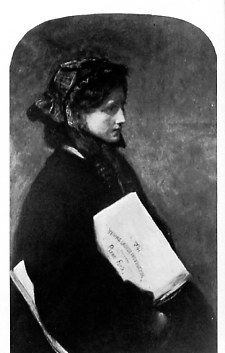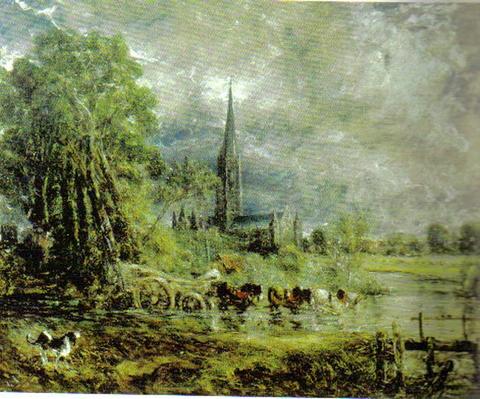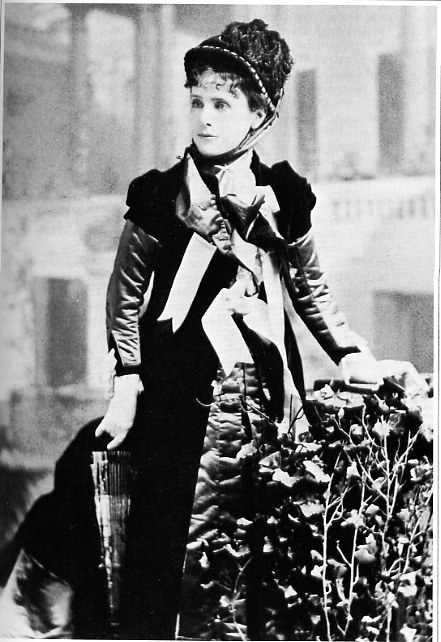A Trollope Conference: held at the University of Exeter
July 17-19, 2006.1
John Constable (1776-1837), Salisbury Cathedral from the Meadows, 1831 (Trollope said his first vision for The Warden came to him while walking in the cathedrale close of Salisbury Cathedral)
The reader will find my summaries and commentaries on Trollope and Gender 1, 2, 3. Nick Hay has also written three reports on the conference from the first, second, and third day. The reader may also read a summary in a blog I wrote in March 2007 of a paper by Stephen Armanack on the uncut The Duke's Children. Fifteen of the forty papers were published in a book called The Politics of Gender. I put summaries and evaluations of these on Politics of Gender 1, and 2 My published paper, "Trollope's Comfort Romances for Men," and my review of Margaret Markwick, Deborah Denenholz Morse, and Reginia Gagnier, edds. The Politics of Gender in Anthony Trollope's Novels: New Readings for the Twenty-First Century Nineteenth-Century Contexts, 33:2 (May 2011): 190-92.
This was the first conference to be held just about Anthony Trollope in 25 years.
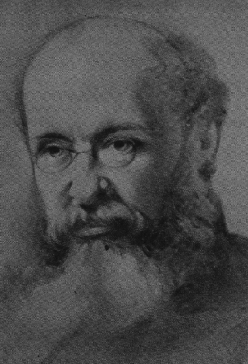
How different was the composition of the people attending then. This time the women outnumbered the men 4 to 1; there were as many people from the US as UK; there were many young people, some of whom had never given a paper at a conference before, and there were many inbetween and older established scholars; there were general Victorianists and people who really were deeply engaged with Trollope.
For me the great pleasure of the conference was meeting Nick Hay and Clare Shepherd, two members of Trollope-l. I also made contact with many Trollope scholars, young and old. I wont write about this except to say that while among the academics at the conference (there were numerous ordinary readers who sported a tag which said "Independent Scholar") there was clearly a pecking order arising from the rank and publication history of the individual, nonetheless, there was remarkably little overt politicking and much genuine egalitarian congeniality and friendliness. We did Trollope proud.
The drawback was the intense heat. The University of Exeter is high on a hill, and what a climb I had each day getting to the Peter Chalk conference center. This center had not one fan, let along anything resembling air-conditioning. Yet there were no windows in several of the rooms, and to get any refreshing air into 2 of the 2 rooms given over to the conference, people opened the outside doors.
From Monday around noon to 5, Tuesday from 9 am to 4:30 pm, and again Wednesday from 9 am to around one in the hot afternoon I listened to papers and at one point gave one myself.
Herewith follows an attempt to summarize the best papers I heard and to describe briefly the rest (including some I didnt hear but were described in the "Programme and Abstracts").
I was that nervous about giving a paper myself on Trollope to a mostly academic audience that I lost my notes for the first day, and forgot to bring my steno pad for the second. When I was finally prepared properly and calm on the third day, there were only two panels on and (of course) in direct conflict, after which came the final roundtable (6 people spoke for 5 minutes each) where we were to discuss Why read Trollope today?, and How persuade adminstrators and such like business people that courses should be given on Trollopes writing?
For this letter Ill just cover what I heard on the first Monday afternoon.
The first key note address (2:00 pm) to me the most enjoyable and stimulating of the whole conference (that I got to hear). Robert Polhemus talked about "older-men-younger-women, father-daughter relationships in Trollope." He began by retelling the Lot story from the Bible, and suggested that in Trollope we find many older men fostering the identity and sexuality and fulfilled futures of younger women. The older men may play a father, brother, or companionate, or implicitly sexual partner role (apparently heterosexual) to the younger women. From "A Ride Across Palestine", Prof Polhemus made visible the fluid and subversive sexuality of the older male narrator and younger woman dressed as a male who travels with the narrator; he argued that "Mary Gresley" was a reverse Jane Eyre: we see the cruelty of the demand the heroine destroy her manuscript to please the male ego of her bethrothed, and how when she goes out to a missionary place with her rigid clergyman-husband, she dies. He quoted allusions to Currer Bell in "Mary Gresley."
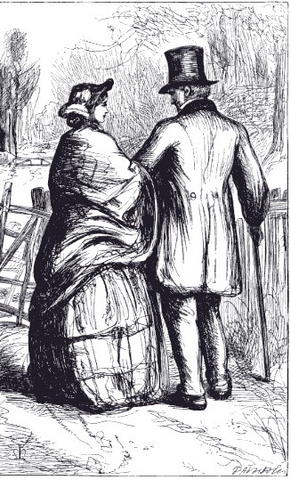
There followed two sets of two panels run at the same time, with one panel directly after the other.
I chose first to go to "Dissonant Feminities I" (3-4:30 pm) where I heard Clare Bainbridges informative and illuminating paper on the regency silver-fork novels and Trollopes fiction. She focused on The Way We Live Now (which along with He Knew He Was Right) appears to have replaced The Last Chronicle of Barset as the very long novel all living Trollopians must know. Elements which puzzle us in Trollope are to be explained by his having taken them over from his extensive reading in the drama from the 1520s to his early manhood (mid-19th century). Ms Bainbridge (an independent scholar) made me want to read Catherine Gores The Bankers Wife (1834). A second paper from this panel I liked very much was on The American Senator. Karen Kurt Teal used paradigms from lecriture-femme to reveal how the novel seems to buy into conservative values while undermining them, and suggested we are to admire and sympathize with Arabella Trefoil who "risks and performs transgressive acts to save herself." Im not sure Trollopes text is as sympathetic towards Arabella as Dr Teal thought, but do recall that Catherine Crean (from Trollope-l) used to write here and she took Arabella as her pseudonym. This suggests some readers find in Trollopes texts much empathetic rebellion, rage, and exposure of what life is for a woman in a society where her self-respect and safety must be found in a rich husband.
I regretted having to miss the panel on at the same time called "Dangerous Liaisons: Family Sagas." Dr Lynn Parkers paper was on predatory brothers in Phineas Finn and Can You Forgve Her? Id say there are many predatory and "protective" brothers in Trollopes fiction. Brothers bully and terrorize their sisters and other female family members to control their sexuality in novels like The Macdermots of Ballycloran< (here the brother is a decent man and is murdered by the state as a scapegoat). I also missed Dr Christine Poulsons "Remarriage and the Stepfamily in Trollopes fiction." The abstract shows she focused on the stigmatizing women had to endure who married for a second time (they were oversexed?) and the kinds of conflicts that emerged between the children of a family and a non-biological mother in a world where money and place and safety are rooted in family relationships. (I regretted missing hers because I do have her wonderful art book, The Quest for the Grail: Arthurian Legend in British Art 1840-1920. Prof Jenny Bourne Taylor showed how possible illegitimacy in Trollopes novels (Ralph the Heir, Lady Anna, Is He Popenjoy?, and Mr Scarborough) functions to expose what were peoples real behaviors and motives inside ambiguous families and also shows Trollopes own contradictory attitudes.
I was attracted to the supposed theme of the first panel (the buzz words "dissonant feminities"); I would have done better to read the abstracts and remember my own reading of Trollopes novels which the latter panels papers would have enriched.
For the second set of panels (5-6:30 pm) I went to "Cultural Markings of Gender" where I heard Dr Sigi Jottkandts paper on how Trollope focuses on male beauty in his novels, Dr Galia Ofeks paper on Trollopes ambivalent attitude towards dirt and false hair (she argued that these alienate yet sexually arouse Trollopes narrator), and Prof Rebecca Resinskis paper on Trollopes use of classical (meaning from Latin literature) allusions in his novels. Prof Resinski is a scholar in classical studies whose etext project, Trollope's Apollo, with her students where they outlined and detail the classical references in the Barsetshire novels Ive put on my website.
On against these were papers attached to a panel called "Its a Boy Thing: Emerging Manhood." Prof Steven Amarnick gave another paper comparing the present bowdlerized or much truncated text for The Dukes Children that we read today compared to the original and much longer text (about a volume longer). I heard him give a previous one comparing the two texts at the New York Trollope society about 2 years ago where it became apparent the original longer text is much darker, more complex, presents Lady Glen and Mrs Finn more subversively and darkens Frank Tregear while allowing the heroine, Mary, to marry him, and contains an ironic ending. I summarized this paper at the time and my summary is in the archives of Trollope-l online at Yahoo. Perhaps I should put this summary somewhere on my site (under the group reads). Steven told me it is now looking as if its possible he could do an edition of this real full text of The Dukes Children. I look forward to it.
There were two papers on the hobbledehoy figure (e.g., Johnny Eames, Tom Tringle, Charley Tudor) in Trollopes fiction. As this type is central and frequent in Trollopes fiction and provides a key to Trollopes understanding and presentation of manliness, masculinity, and sympathetic identification with a masculinistic point of view, the patriarchical ordering of our society, and misogynistic conceptions of some female types I realized afterwards I should probably have gone to them. I do disagree with Dr Hyson Coopers point of view thoroughly and do not see the presentation of male types in Ayalas Angel as simply restrictive or unnatural, as is apparent in my paper, "Trollopes Comfort Romances for Men".
Then there was tea, wine, and refreshments. Clare was kind enough to drive me down the hill so I could make a train back to Lympstone Village quickly where I was staying. Jim was waiting for me on the platform. We had a good meal, went to a pub and drank and mingled with the local people a bit, walked along the beach, and wandered in the village up to the old church and back again alongside the cliffs, and, then, to bed.
Tuesday was supposed to be a very long day. Sessions were to begin at 9 am and end at 5:30 pm; there was supposed to be a 2 hour break and then a dinner. In the event, one of the two keynote speakers didnt show, nor did he send a paper (!) and so the last sessions for the day were moved up, a tea was offered and the day was finished at 4. Three and one half hours was too long to wait in the heat for a dinner Id have to leave early (as there was no late train back to Lympstone from Exeter St Davids), so I went back at 4:30 and arrived at the tower by 5.
The day again opened (9 am) with a keynote address: by one of the conference organizers, Deborah Denenholz Morse. Prof Morse presented a post-colonial reading of He Knew He Was Right. There is a long detailed summary of her argument in the Programme and Abstracts for the conference; basically she argued that beyond making visible in the story of Louis and Emily Trevelyan the oppressive patriarchal power structure, one where the male seeks to control and repress the distrusted sexuality of his wife, in He Knew He Was Right Trollope uses Emily and the place she comes from to show how European males sought to imprison and quell slaves, the colonized peoples they were exploiting. She used the analogy Trollope sets up between Shakespeares Othello and this novel to suggest that we have a racial story. The three romantic subplots are there by contrast.
By the end of her talk she had convinced me. Strong evidence came from the descriptions of Emily (dark and passionate) and the many references in the book to Englands colonial empire as well as the characterization of Hugh Stanbury and Nora Rowleys modern (relatively free and equal) relationship. Im still inclined to find the analysis of the novel I present in one of the chapters of my book more central: that the Trevelyan story is one of sexual anxiety and jealousy, with an intensely frustrated wife who despises a psychologically weak if tyrannical husband, with the other three stories mirroring better and parallel situations and solutions to the problem of the interaction of dominance and submission in human relationships. Her reading added or uncovered another layer or thread of meaning running through this big complex book.
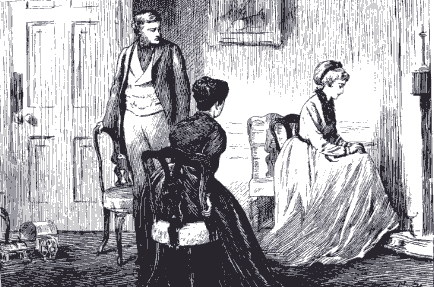
There again followed two sets of two panels run at the same time, with one panel directly after the other. The themes across both were class, gender, masculinity, race, ethnicity, and imperialism in Trollopes fiction.
This time I chose the session which was about the lesser known short stories and novels. Dr Helen Blythe examined Trollopes presentation of European colonizers who try to hold onto their Englishness or gentility. "Catherine Carmichael, or Three Years Running" (set in New Zealand) was her text. Holding onto genteel class ideals is seen by Trollope as central to their cherished identities and very survival. Catherine Carmichael endures brutal behavior from a husband who scoffs at such norms.
Dr Susan Shelangoskie presented a lucid thorough-going analysis of Trollopes presentation of young women in a newly technological world which offered them independence through work. Trollope is for this as long as the work remains subordinate towards what is to be the young womans "real" goal: marriage to a man. She showed how the norms and customs used to control women in the home were transferred to work outside the home. Her texts were Trollopes short story, "The Telegraph Girl" and non-fiction journalistic article, "The Young Women at the Telegraph Office".

I found Dr Blythes analysis compelling and told her about the recent powerful Australian film, The Proposition where the goal English police officer (played by Ray Winstone) struggling to make a genteel life for himself and his wife (played by Emily Watson) in the bush in Australia, is much sympathized with, but shown to have a unrealistic if poignantly understandable goal. She is raped and he near murdered by the desperate bush rangers he must try to subdue. Dr Shelangoskis paper was sensible, straightforward and accurate. I was glad she called attention to the little-known article, and she told me afterward that she had found my online bibliography for the short stories and etexts of non-fiction very helpful.
To be honest, as I was to give my paper within the next hour I was too nervous to listen closely to the third speaker.
Of the papers in the panel I didn't hear, the one which had attracted me most (from the abstract) was an analysis by Prof. Mary Jean Corbett of the conflicts in identity Phineas Finn experienced: "Two Identities: Gender, Ethnicity, and Phineas Finn I thought this meant "Does he enact an Irishman really? Is this a feminized masculinity? Have readers mistakenly perceived Finn to be 'too much like a woman'?" Prof Corbett discussed the intersection between Irish and English identities as they were seen stereotypically at the time.
(From the abstract I had thought its phrases and thus paper referred to how Phineas might to conventional thinking appear to be weak because he is willing to change his mind (=womanish), especially since at the close of Phineas I, Phineas loses his battle to maintain his integrity and yet stay within Parliament. What attracts me to Phineas II is since he is Irish and Catholic but also a gentleman Phineas remains a half-outsider, a fringe person. Thus since most of the characters are indifferent to all but their own interests, Phineas becomes a target for radical distrust, is put on trial for murder, and experiences intense depression when his illusions about how his friends view him as one of them and as an honorable man, and about their capacity for loyal friendship, are shattered. To me Phineass sensitivity is central to the finest elements in his character and Trollopes iconoclastic depiction of manliness in his heroes.) I was the first speaker in one of the two second sets of panels, and have now put my paper online: Trollope's Comfort Romances for Men: Heterosexual Male Heroism in his Work.
Here is my central argument:
My argument is that Trollopes most profound analyses of characters reside in his perceptive realistic depiction of male heterosexual patterns of sexuality as these conflict with the social customs of his age and ours. Drawing on his personal experience, Trollope justifies unheroic heroes and redefines worldly loss, defeat and individual withdrawals from social life and competition as misunderstood and understandable choices whose courage is underrated; through his presentation of heterosexual heroes Trollope defends his male readers against the norms he suffered from as a boy, young man, and as a older successful man too. There is much subversion here: very unusually Trollope gazes boldly on heroes who are not sexually and socially triumphant. He repeatedly presents the norms for such triumphs as oppressive, shallow, and even useless and counterproductive except when powerful characters instinctively admire them. He frequently sympathizes with males who regard the demand that they enact masculinity in dominating, aggressive, glamorous and overtly ranked-based ways as distasteful and against the grain of their character; they are unable or unwilling to articulate their point of view because they fear shaming and defeat. Their inability or refusal to manipulate these social codes disables them in the continual struggle for dominance against submission that Trollope depicts as also what shapes most human relationships. When their story is tightly interwoven with that of strong, passionate, frustrated or equally repressed, and obtuse and understandably vindictive women, they become crippled, paralyzed and tragic figures.While I ranged across Trollopes oeuvre in my opening few paragraphs and closing two, I focused in the center of the talk on Miss Mackenzie,Is He Popenjoy?, and Ayalas Angel. In the last panel of the third day people were asked to answer the question why should we read Trollope today. My answer was:
In an era where we find ourselves in the midst of a re-masculinization of the norms of behavior and art in terms of a narrow macho male ideal, where not only a womans freedom to express her sexuality is contested, but a mans is too, Trollopes male romances provide a salutary alternative and ironic reading of heterosexual male personalities. Trollope has provided us with material capable of opening up our understanding of masculinity, manliness, and heroism so as to enable mens lives to be less unhappy.
I was still too excited to listen to the second paper in my panel. I spent the time calming down. I did, though, listen to third presentation, Prof David Skiltons talk. He argued that the way that the thought processes in making choices which Trollope endows women with allows modern readers to find in the womens subjective life the same depth and richness of thought that we find in his mens subjective life so that it does not matter if the womens actual or literal choices for how they will spend their lives are severely limited.
Im not sure I was persuaded that the literal limited choices can be overlooked just in favor of ethics and psychology as such, for the latter are dependent on experience hoped for as well as had. Im also not sure that womens thoughts processes are the same as mens. However, he presented such good quotations from Trollopes novels, and included some of the most fascinating characters like Mary, Lady Mason, the tragic heroine of Orley Farm, who forges a will in order to give her son a chance at gentlemenly status, and women of "action" like Lady Laura Kennedy (the Phineas books), and women making conflicted major life choices (e.g. Alice Vavasour from Can You Forgive Her?) and women carrying on a career next to their husbands (Lady Glencora Palliser).
We all then broke for lunch. Quiche, sandwiches, fruit, coffee, juice and wine were on hand. We could eat at the large windows or outside on picnic tables. I much enjoyed mingling with the participants and talking to Nick, Clare, and Rob Polhemus for a while.
Again there were two sets of panels. This time I did not go to "Dissonant Feminities" but instead treated myself to Michael Brooks witty talk, "Anthony Trollope: American Feminism, and the women on the New York City horse cars." Since I still mean to try to write a paper on Trollopes North America, that being his text made his talk clearly useful for me. He divided the women Trollope encountered during his time in North America as women who challenged the system of separate spheres and women who didnt, and said that while Trollope disagreed with the first group, he responded to them with a patient tone (and liked some of them very much); as to the second group, Trollope castigated these women when they were aggressive. He said Trollope did not like women to have separate spheres (like ladiess drawing roolms) in public. These were invented for women to come out comfortably in public.
A good deal of Prof Brooks talk was about Kate Field and Trollopes ambivalent and ambiguous love relationship with her. Id like to read the biography of her life he mentioned and some of her writing. He also described some books by feminists which Ill see if I can get hold of, e.g., Catherine Dalls "Womens Right to Labor." Like Field (and Barbara Bodichon whose "Women and Work" I argued in my notes to my paper Trollope read), Dall argued women had a right to a career, to do useful work for a living wage. Prof Brooks said Trollopes chapter on women in North America was partly meant as a refutation of Dall. In it Trollope insists "the best right a woman has is the right to a husband."
As I recall, Trollope said the woman question is about male power and to give women incomes and independence is to take power from men, i.e., jobs, money, control, the ability to dictate how their lives in private shall be led without having to shape themselves by a particular womans needs. His strongest point I thought was the one that if you allow women to work for money, soon men will refuse to support them or demand that they equally support the household. His weakest point is his basis: he insists on pretending that men do in fact support women willingly and stay married to them, and that men do in fact treat women well. In reality a large proportion of women spend their lives single and when you give people power most will take ruthless advantage of those they can control, and here we are talking about mens control of womens bodies.
A smaller point brought up in Prof Brookss talk: it is true that Trollope produces "astonishing diatribes" towards women who wear crinolines and demand equal literal space in public with men. When we read the text on Trollope-l and I studied it afterwards I became convinced that he deeply resented women behaving independently of men as if they were not beholden to men for not attacking them physically. He seemed to feel that "chivalry" was something men did by choice for women, and if women didnt show gratitude, the men were justified in "returning" to making visible how brute power was the source of the social order which gave men control over women.
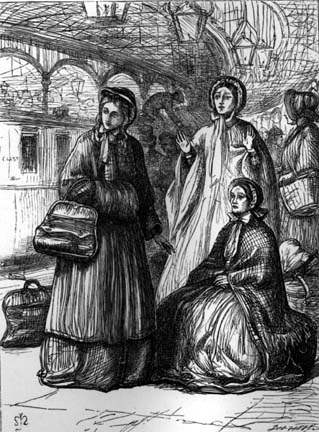
The other two papers I heard and the three in the other session were all feminist in outlook. Maia McAleavey, a doctoral candidate at Harvard, showed how Trollopes request that the reader "love" Lily Dale revealed how he was imagining this reader to be a male who is erotically desirous of this imagined seductively sexually yielding victim-heroine. There was a paper by a DPhil student, Yvonne J. Huang, on Trollopes hunting women and one by Prof ILana Blumberg about how Trollope presents female self-sacrifice as something they take pleasure in which gives them what they (really?) want: both papers were about 19th century womens struggle for autonomy as mirrored in Trollopes strongly masculinistic fiction. Prof Anca Vlasopolos focused on Trollopes short story, "Mary Gresley" (as had Prof Polhemus) and Trollopes novella, Sir Harry Hotspur: for her in the first we see the destruction of a young woman from the distanced approving perspective of an older man; in the second, the erasure of a young woman who devalues herself. The value of these for the modern reader is they allow us insight into Victorian gender politics.
Just on Sir Harry Hotspur Ive always felt this sympathetic tragic romance (Trollope wants us to grieve over the heroines death) anticipates Henry Jamess Washington Square. I prefer Jamess story as it seems to me more truthful about how the relationship between parents and children are adversarial as well as supportive. Trollope buys into the myth of young female masochism before the sadistic rake male while James shows the cruelty and indifference of people (in this story just about everyone) and their willingness to bully and use the sensitive and good-hearted. I find it unbearably moving when Catherine Sloper turns her face to the wall and lives within and on herself rather than be hurt so radically again. Erasure in this James story is safety and peace. Jamess heroine didnt have to die but can live on in the minimal way described by Virginia Woolf at the close of A Room of Ones Own; alas, that she has lost all hope and will not create anything outside herself for she does not think anyone will appreciate or use it well. She does provide money and services for the poor.
When this last session was over, everyone trooped out to the front area where we had had lunch and there was tea and cakes and biscuits and cheese. To me it was too hot for tea and any sweets so I drank cool water. I talked with Nick and Clare for over half an hour and then Clare again drove me down the hill to the train station. I was very lucky as an air-conditioned long train (from London) had just driven up. I jumped inside.
Half an hour later Edward was walking on the beach just in front of the tower when I arrived. Since we had planned to do this (and had not bought anything to cook for supper), we went out to eat in one of the two good pubs (I liked the meal) and then went for another long stroll. We were back in our tower by 10 and asleep before the clock tolled 11.
The third day was a 2/3s do: two sets of panels occurring at the same time for an hour and one half; a half-hour of refreshments, and then a 2 hour plenary roundtable discussion where 6 people were to talk for 5 minutes on the questions, Why read Trollope? and how justify paying people to teach Trollope in schools and colleges?, and then the audience was really to participate by responding to the panel members and the questions. While it seemed much less food for thought would be on offer, in fact one of the papers given at the session I attended if really taken seriously by critics and readers of Trollope reading community would transform how Trollope is read, and the plenary discussion included some of the most interesting and candid discussion I heard during all three days.
The revolutionary paper was Margaret Markwicks "Out of the Closet: Homoerotic relationships in Trollopes Novels." She began by stating she can find no homophobia in Trollope, but rather a strong endorsement of sexual desire as pleasurable and (when kept within the bounds of marriage) healthy. She argued that it was in the 20th century that a narrow and rigid idea of homoerotic behavior identified homosexuality with anal intercourse, and excluded all else. In Trollope she finds a continuum of flexible sexual behavior which includes homosocial and homoerotic relationships. Using Mark Turners analysis of Trollopes short story, "A Ride Across Palestine" and "The Turkish Bath", she identified Orientalism as a coded vocabulary intended to suggest male genital homosexuality (this is so and may be seen in Chapter 3 of Woolf's Orlando, and herself dwelt on pairs of males in The Vicar of Bullhampton (the Vicar, Frank Fenwick, and the man the heroine rejects, Harry Gilmore) and Castle Richmond (the adolescent boy, Sir Patrick Desmond and the tragic romance hero, Owen Fitzgerald who ends up isolated).
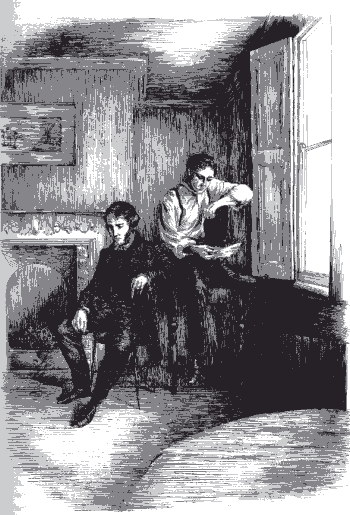
In her five minutes on the plenary panel she indicated that a reader can make out sympathy on Trollopes part for two semi-lesbian single women, Wallachia Petrie (a caricatured female suffragist) and Priscilla Stanbury (who retreats from a society which will give her no useful work to do with her considerable intelligence).
As in Prof Morse's paper, the evidence presented in the argument felt very persuasive to listen to. My question to Prof Markwick was whether she was overreading aspects of Trollopes use of intense emotionalism in his in-depth characterizations of personalities in extremis to allow us to read into them homoerotic relationships. I was also troubled by an optimistic stance similar to that in her upbeat Trollope and Women: she seemed to read all that was presented as sheerly beautiful and positive, with relationships projecting or leading to possibilities of sheer joyous fulfillment, while in Trollope there is much ambivalence towards all human relationships as based on dangers exploitations of power, as potentially and in fact often humiliating, destructive, and when thwarted neurotic or morbid. Trollope's characters often get badly hurt as a result of their sexual needs.
Nonetheless, if she can make people read in Trollope's fiction the perceptive humane flexible sexuality she sees, she will have done a remarkable service to Trollope readers. Her reading could attract a whole new audience for Trollope and new kinds of studies. I hope her book is published by Ashgate soon.
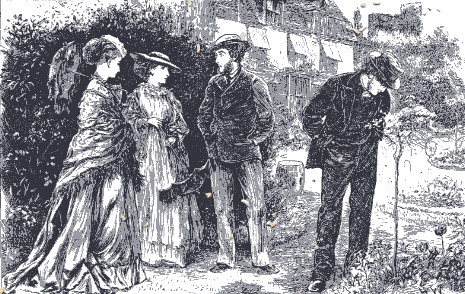
The panel Prof Markwick's paper was part of was called "Regenderings." It included Prof Christopher Noble's excellent paper on Trollope's depiction of "masculinized" widows: Arabella Greenow (Can You Forgive Her?, Madame Max Goesler (the Phineas books), and Emily Lopez (The Prime Minister). He too presented a positive view, this time of these characters use of their sexual attractiveness and resistance to oppressive unsympathetic norms. The characters he chose all used what (contingent) power and resistance they had ethically or do not attempt to hurt anyone. I responded by instancing Lady Lufton's attempt to maneuvre her son, Lord Lufton, into marrying the cold cruel Griselda Grantly, and her dismissal of Lucy Robarts as "unimpressive at a dinner table." Nick mentioned to me how Aunt Staubach harassed Linda Tressel to death.
I was troubled by a third paper which I may well not have understood, but seemed to deprecate the practical and intellectual gains of the 19th century liberal progressive movement (as seen in the work of John Stuart Mill) and recent 1970s feminist thought. It was implied that Catherine MacKinnon was against sexual fulfillment and Carol Patemans Sexual Contract wrong (!). Once again there seemed to be an avoidance of critiquing the pain Trollope's characters' use of power (female as well as male) inflicts on other characters. I guessed that there was a "third-wave" feminism point of view in the paper but am not sure.
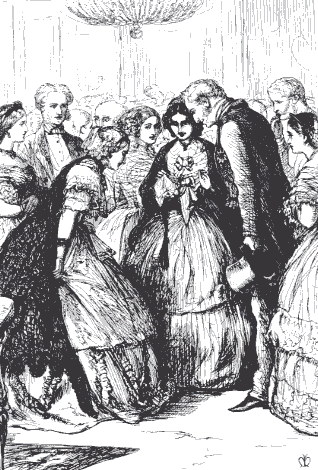
The second panel on at the same time was called "Gender and Modernity," and there I missed a subtle and witty paper by Prof Ken Newton where he showed how Trollope undermines realism, and writes in a self-consciously post-modern sceptical and self-reflexive way. I know about the tones and quality of this paper since Prof Newton presented part of it as his 5 minute talk on the plenary panel.
What made the plenary session so good was many of the members of the audience really expressed their thoughts honestly and engaged in genuine dialogue with one another. The reasons given for reading Trollope and getting paid to teach Trollope were not surprizing: hes readable, varied, had a long career in which he wrote rich, intelligent books alive to the central controversies of his and our era; he absorbs our minds and is practical; he teaches a decent ethics. One person argued wittily that we shoudl not read Trollope nor be paid to teach him since he is a dead white male and presents a world where only dead white males get to use their talents; the most wonderful women in his novels end up leading lives of dessicated spinsterhood, dull cowhood, or are presented in caricatures as thwarted, domineering, amoral harpies. Most amusing was David Skilton's argument that we need first to counter and do away with as an utter distortion the Tory way of reading Trollope identified with the British Trollope Society.
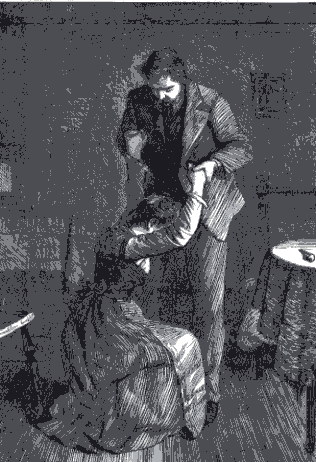
I cant begin to report the statements made by all the people in the room over the two hours. I liked how Nick countered that in real life Trollope wouldve been against strikes, and many of his positions were conservative. A reiterated assertion by British people was that Trollope is still not respected by British academics. Trollope was defended as deep, poetic, not anti-semitic, broad and perceptive in his understanding of colonialism, and he was described as vulgar, keeping to the surface, using realism to exclude tabooed experiences. I talked of the difficulty of presenting his texts to African-American young men at the same time as I said (from experience) they were drawn to characters like Phineas Finn, men on the make, doubting disillusioned outsiders who are ambitious and successful.
I did want to defend the chairman of the Trollope Society, John Letts, from too much identification with the Tory way of reading. He was an unconventional man, remarkable and perceptive in his reading of Trollope, generous to me and others. I remember how he went to California to encourage a woman there who was building a small Trollope Society. He was willing to exploit the Tory way of reading to build a larger society and publish all Trollopes fictions and much of his book-length and popular non-fiction in a uniform edition, and did just that. His initiatives put Trollope back on the cultural map and encouraged other publishers to publish Trollopes novels too.
But alas I hadn't the courage. I feared I might be seen as showing off a relationship I had with Letts, and my book (which partly came from this relationship); Ive learned over the years on lists that its risky to bring up personalities other people have known. And it is true that the Trollope Societies attract wealthy conservative types. The activities planned are often very expensive (e.g., extravaganza trips, dinners at famous old places). You are expected to dress up a lot. Jim and I went once to a dinner at the New York Trollope Society and met many lawyers, bankers, and stockbrokers. At the same time we heard a wonderful paper by N. John Hall, a witty one by a man then in Parliament, and two years ago Steven Amarnicks 1st paper revealing that the full or real The Duke's Children we read is a much longer, richer, and more pessimistic work. So I place this defense here.
It was 1 o'clock in the afternoon and time for the meeting to end. People came up to one another to make contact, renew friendships and say adieu. These five to ten minutes included some of the pleasantest conversations I had for all three days. It seemed so many people had enjoyed themselves very much, been rejuvenated in their work, were glad they had come and hoped to see one another again. Me too. I believe I garnered 4 new members for Trollope-l, at least one of which may become an active participant.
For myself I was recognized as a Trollope scholar and person, made new friends and renewed some old acquaintances, and now think I will indeed go ahead and write my paper on "On Living in a New Country: Trollopes North America and Australia and New Zealand and send it to that journal I was invited to send it to, The Antipodes.
For the rest of the afternoon we were in Exeter and for the weekend, London where we visited Carlyle House, saw the Constable exhibit at the Tate Britain and a modern adaptation of Chekhov's Seagull.
